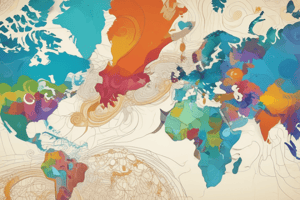Podcast
Questions and Answers
What is the primary aim of global governance?
What is the primary aim of global governance?
- To eliminate non-state actors from the international scene
- To promote peace, stability, and cooperation (correct)
- To establish a hierarchical system of states
- To promote competition among states
What is a key feature of global governance that facilitates cooperation among multiple states?
What is a key feature of global governance that facilitates cooperation among multiple states?
- Bilateralism
- Unilateralism
- Regionalism
- Multilateralism (correct)
What is the role of international institutions in global governance?
What is the role of international institutions in global governance?
- To provide humanitarian aid
- To promote peace, security, and cooperation
- To establish rules, norms, and standards for state behavior (correct)
- To establish a new world order
What is a challenge to global governance related to the distribution of power among states?
What is a challenge to global governance related to the distribution of power among states?
What is a potential benefit of global governance in the area of security?
What is a potential benefit of global governance in the area of security?
Which of the following is an example of a regional organization?
Which of the following is an example of a regional organization?
What is a characteristic of global governance that distinguishes it from traditional international relations?
What is a characteristic of global governance that distinguishes it from traditional international relations?
What is a challenge to global governance related to the increasing complexity of global issues?
What is a challenge to global governance related to the increasing complexity of global issues?
Flashcards are hidden until you start studying
Study Notes
International Security: Global Governance
Definition: Global governance refers to the system of rules, institutions, and processes that regulate the behavior of states and non-state actors at the international level, aiming to promote peace, stability, and cooperation.
Key Features:
- Multilateralism: Global governance involves cooperation among multiple states and international organizations to address common challenges and promote shared interests.
- Institutional Framework: Global governance relies on a network of international institutions, treaties, and agreements that establish rules, norms, and standards for state behavior.
- Non-state Actors: Global governance involves not only states but also non-state actors, such as NGOs, multinational corporations, and international organizations.
Global Governance Institutions:
- United Nations (UN): A premier global governance institution, promoting peace, security, and cooperation among member states.
- International Organizations (IOs): Examples include the World Trade Organization (WTO), International Monetary Fund (IMF), and World Health Organization (WHO).
- Regional Organizations: Examples include the European Union (EU), African Union (AU), and Association of Southeast Asian Nations (ASEAN).
Challenges to Global Governance:
- Sovereignty: States may resist ceding authority to international institutions, undermining global governance.
- Inequity: Power imbalances among states and unequal representation in international institutions can hinder effective governance.
- Complexity: The increasing complexity of global issues, such as climate change and cybersecurity, can overwhelm global governance structures.
Opportunities for Global Governance:
- Collective Security: Global governance can facilitate cooperation on shared security concerns, such as counter-terrorism and non-proliferation.
- Economic Cooperation: Global governance can promote economic cooperation, trade, and investment, driving growth and development.
- Human Security: Global governance can address human security concerns, such as human rights, health, and environmental protection.
Conclusion: Effective global governance is essential for addressing the complex security challenges of the 21st century. Strengthening international institutions, promoting multilateralism, and addressing the challenges faced by global governance can help foster a more peaceful and stable international environment.
Global Governance
- Global governance is a system of rules, institutions, and processes that regulate the behavior of states and non-state actors at the international level, aiming to promote peace, stability, and cooperation.
Key Features
- Multilateralism is a key feature of global governance, involving cooperation among multiple states and international organizations.
- Global governance relies on an institutional framework of international institutions, treaties, and agreements that establish rules, norms, and standards for state behavior.
- Non-state actors, such as NGOs, multinational corporations, and international organizations, play a role in global governance.
Global Governance Institutions
- The United Nations (UN) is a premier global governance institution, promoting peace, security, and cooperation among member states.
- International organizations (IOs) like the World Trade Organization (WTO), International Monetary Fund (IMF), and World Health Organization (WHO) are part of the global governance structure.
- Regional organizations like the European Union (EU), African Union (AU), and Association of Southeast Asian Nations (ASEAN) also play a role in global governance.
Challenges to Global Governance
- States may resist ceding authority to international institutions, undermining global governance, due to concerns about sovereignty.
- Power imbalances among states and unequal representation in international institutions can hinder effective governance, leading to inequity.
- The increasing complexity of global issues, such as climate change and cybersecurity, can overwhelm global governance structures.
Opportunities for Global Governance
- Collective security can be facilitated through global governance, promoting cooperation on shared security concerns, such as counter-terrorism and non-proliferation.
- Global governance can promote economic cooperation, trade, and investment, driving growth and development.
- Addressing human security concerns, such as human rights, health, and environmental protection, is another opportunity for global governance.
Conclusion
- Effective global governance is essential for addressing the complex security challenges of the 21st century.
- Strengthening international institutions, promoting multilateralism, and addressing the challenges faced by global governance can help foster a more peaceful and stable international environment.
Studying That Suits You
Use AI to generate personalized quizzes and flashcards to suit your learning preferences.




